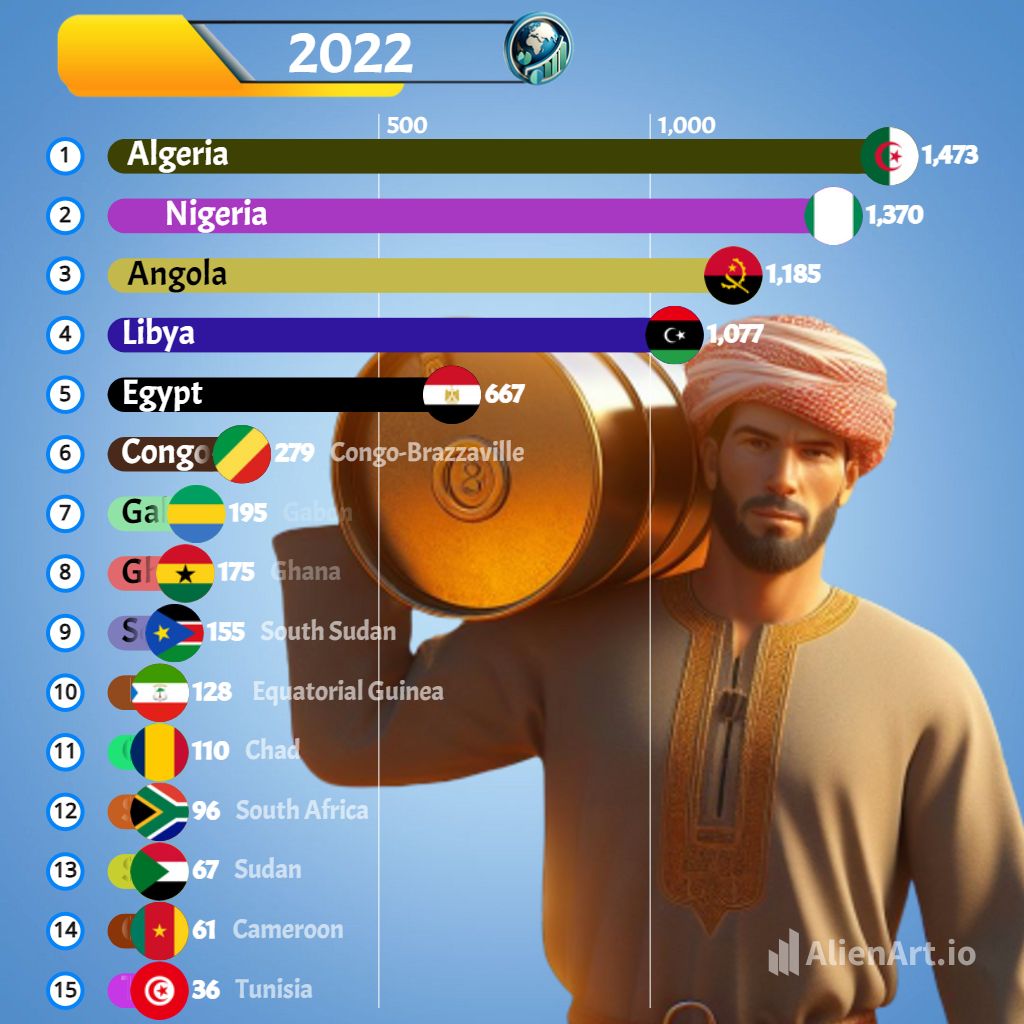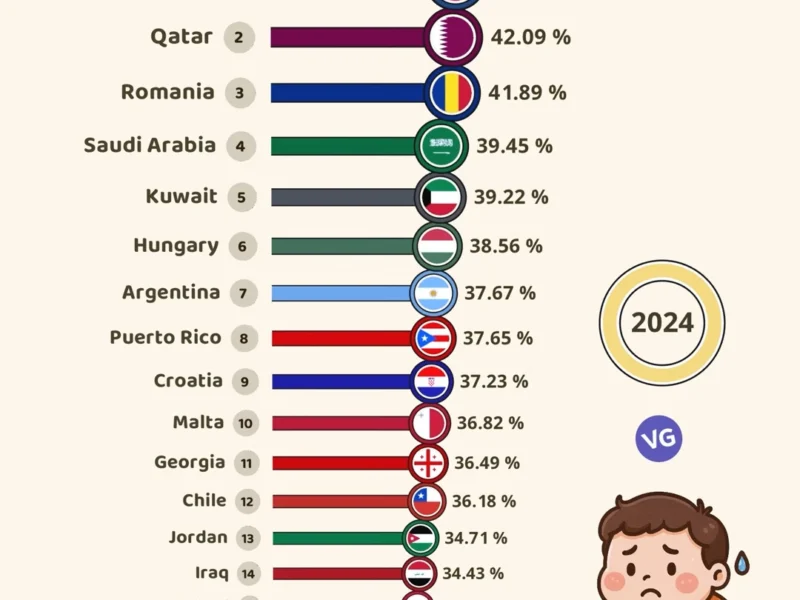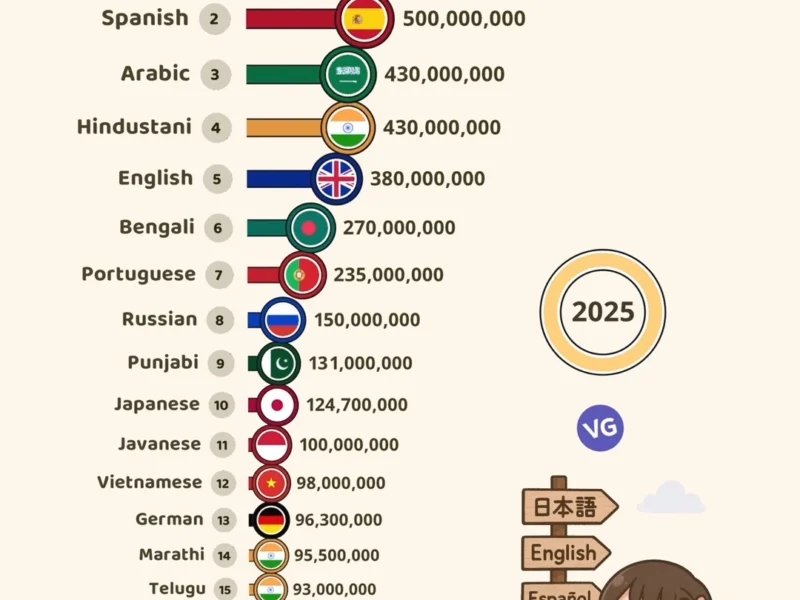Introduction: The Continent’s Black Gold
he African continent is endowed with an abundance of natural resources, chief among them the prized liquid gold known as oil. From the vast deserts of the Sahara to the lush rainforests of the equatorial regions, Africa’s oil reserves have fueled economies, shaped geopolitical landscapes, and ignited dreams of prosperity. This article delves into the intricate tapestry of Africa’s oil industry, exploring the titans that dominate the sector, the emerging players vying for a slice of the proverbial pie, and the challenges and opportunities that lie ahead.
| Country | Oil Production 2022
|
| Algeria | 1473.0306811789 |
| Nigeria | 1369.9204416958 |
| Angola | 1185.2543993969 |
| Libya | 1076.8345815845 |
| Egypt | 666.64874421876 |
| Congo-Brazzaville | 279.34810531007 |
| Gabon | 195.48683291344 |
| Ghana | 175.25798717056 |
| South Sudan | 155.10958630537 |
| Equatorial Guinea | 128.38356164384 |
| Chad | 109.56438356164 |
| South Africa | 96.373935201437 |
| Sudan | 66.687717190916 |
| Cameroon | 61.262025837809 |
| Tunisia | 36.446484653019 |
| Cote d'Ivoire | 31.41025112946 |
| Congo-Kinshasa | 21 |
| Niger | 8.4072330664035 |
| Zimbabwe | 0.8 |
| Zambia | 0.13933928027331 |
| Morocco | 0.025 |
| Benin | 0 |
| Botswana | 0 |
| Burkina Faso | 0 |
| Burundi | 0 |
| Cabo Verde | 0 |
| Central African Republic | 0 |
| Comoros | 0 |
| Djibouti | 0 |
| Eritrea | 0 |
| Eswatini | 0 |
| Ethiopia | 0 |
| Gambia, The | 0 |
| Guinea | 0 |
| Guinea-Bissau | 0 |
| Lesotho | 0 |
| Liberia | 0 |
| Madagascar | 0 |
| Malawi | 0 |
| Mali | 0 |
| Mauritania | 0 |
| Mauritius | 0 |
| Mozambique | 0 |
| Namibia | 0 |
| Reunion | 0 |
| Rwanda | 0 |
| Saint Helena | 0 |
| Sao Tome and Principe | 0 |
| Seychelles | 0 |
| Sierra Leone | 0 |
| Somalia | 0 |
| Tanzania | 0 |
| Togo | 0 |
| Uganda | 0 |
| Western Sahara | 0 |
| Senegal | -0.027069782913975 |
| Kenya | -0.031167996503387 |
Defining Oil Production and Its Significance
Oil production, the process of extracting crude oil from the Earth’s subterranean reservoirs, is a complex and capital-intensive endeavor. It involves a series of stages, from exploration and drilling to extraction, refining, and distribution. The significance of oil production in Africa cannot be overstated, as it has been a driving force behind economic growth, government revenues, and international trade for many nations.
The Lifeblood of Economies: Oil’s Vital Role
Oil has been aptly described as the lifeblood of many African economies, providing a crucial source of revenue and foreign exchange earnings. Countries blessed with substantial oil reserves have experienced periods of rapid economic growth, fueled by the influx of petrodollars from oil exports. However, this reliance on a finite resource has also exposed these nations to the volatility of global oil prices and the phenomenon known as the “resource curse,” where an abundance of natural resources can paradoxically impede economic growth and foster corruption.
https://youtu.be/XeM1n4Gfo9s
Africa’s Oil Giants Unveiled
Algeria: North Africa’s Powerhouse

Algeria, a nation situated in the heart of North Africa, has long been a powerhouse in the continent’s oil industry. With its vast reserves spanning the Saharan Desert, Algeria has leveraged its strategic location and abundant resources to become a major player on the global energy stage.
Nigeria: Dominating the West African Scene

As the giant of West Africa, Nigeria stands as the continent’s largest oil producer, boasting vast reserves that span both onshore and offshore fields. The Niger Delta region, in particular, has been a focal point for exploration and production activities, attracting major international oil companies and contributing significantly to the country’s economic growth.
Peaks and Valleys: Nigeria’s Production Journey
Nigeria’s oil industry has been a rollercoaster ride, with periods of prosperity punctuated by challenges such as environmental degradation, militant activities, and infrastructure constraints. Despite these hurdles, the country’s vast reserves and ongoing reforms position it as a key player in the global oil market, poised for continued growth and development.
Angola: A Force to be Reckoned With

Emerging from decades of civil conflict, Angola has solidified its position as one of Africa’s leading oil producers. The country’s offshore fields, particularly in the prolific Kwanza Basin, have attracted significant attention and investment from international energy companies, fueling Angola’s economic resurgence.
Resilience Amid Challenges: Angola’s Story
Angola’s oil story is one of resilience in the face of adversity. Despite years of turmoil and instability, the country has leveraged its offshore bounty to rebuild its economy and establish itself as a force to be reckoned with in the global oil market. However, Angola also recognizes the need to diversify its economy and reduce its reliance on this finite resource, paving the way for a more sustainable future.
Libya’s Turbulent Relationship with Oil

Libya’s oil industry has been a rollercoaster ride, with periods of prosperity punctuated by political turmoil and conflict. Despite its challenges, the country’s vast reserves hold immense potential for future development and economic growth.
Rebuilding and Resurgence: Libya’s Path Forward
As Libya navigates its path towards stability, efforts are underway to rebuild and revitalize the country’s oil industry. International partnerships and investments are being sought to modernize infrastructure, enhance production capabilities, and unlock the full potential of Libya’s vast but volatile resources.
Emerging Players in Africa’s Oil Landscape
Egypt’s Rising Star
Egypt’s oil industry has undergone a renaissance in recent years, with the discovery of new fields and the application of modern exploration and production techniques. This ancient land, once home to pharaohs and pyramids, now holds the promise of modern energy reserves.
Untapped Potential: Egypt’s Oil Aspirations
The Nile Delta and the Western Desert regions of Egypt have been the epicenters of the country’s oil boom. New discoveries and enhanced recovery techniques have unlocked previously untapped reserves, positioning Egypt as an emerging player in the African oil scene. As the world transitions towards a more sustainable energy future, Egypt has also recognized the need to diversify its energy mix, investing in renewable sources such as solar and wind power.
Congo-Brazzaville: Central Africa’s Hidden Gem
The Republic of Congo, also known as Congo-Brazzaville, has long been regarded as a petro-economy, with oil production forming the backbone of its economic activities. This Central African nation has leveraged its onshore and offshore reserves to establish itself as a significant player in the region.
Exploring the Depths: Congo-Brazzaville’s Offshore Bounty
Congo-Brazzaville’s oil production is a tale of two fronts: offshore and onshore. The country’s offshore fields, particularly in the Pointe-Noire region, have been a major contributor to its oil output, attracting investment and fueling economic growth. Meanwhile, onshore fields in the Cuvette and Coastal basins have also played a crucial role in sustaining production levels.
Gabon’s Steady Stream
Gabon, a small nation nestled in Central Africa, has taken a unique approach to its oil industry, seeking to strike a balance between resource exploitation and environmental conservation. This eco-friendly approach has garnered international attention and positioned Gabon as a model for sustainable oil production.
Balancing Act: Gabon’s Oil and Environmental Dynamics
Gabon has implemented a range of measures to mitigate the environmental impact of its oil industry, including strict regulations on flaring, investments in renewable energy sources, and the establishment of protected areas and national parks to safeguard biodiversity. This approach has enabled the country to maximize the potential of its reserves while minimizing the ecological footprint, striking a delicate balance between economic growth and environmental stewardship.
Ghana’s Promising Future
Ghana, a West African nation with a rich cultural heritage, has emerged as a promising player in the continent’s oil game. The country’s offshore fields have captured the attention of international energy companies, fueling hopes of economic prosperity and development.
Riding the Wave: Ghana’s Offshore Ambitions
Ghana’s oil story is inextricably linked to its offshore resources, particularly in the prolific Tano Basin. The Jubilee Field, one of the country’s largest discoveries, has been a catalyst for Ghana’s oil ambitions, attracting investment and spurring the development of new infrastructure and support industries.
South Sudan’s Newfound Wealth
South Sudan, the world’s newest nation, has emerged as a promising player in the African oil game. Despite facing numerous challenges since its independence in 2011, the country’s vast untapped reserves hold the potential to fuel its economic development and reconstruction efforts.
Overcoming Obstacles: South Sudan’s Path to Prosperity
South Sudan’s oil reserves are concentrated primarily in the Muglad and Melut basins, located in the northern regions of the country. While these reserves have remained largely unexploited due to years of conflict and instability, they hold immense potential for future development. For South Sudan to fully capitalize on its oil wealth, it must overcome a host of challenges, including political instability, infrastructure deficiencies, and a lack of foreign investment.
Equatorial Guinea’s Oil Boom
Despite its modest size, Equatorial Guinea has carved out a niche for itself in the African oil market. This small Central African nation has leveraged its offshore resources in the Gulf of Guinea to fuel its economic growth and attract international investment.
Diversification Efforts: Equatorial Guinea’s Economic Shift
As a relatively new player in the oil game, Equatorial Guinea faces the challenge of managing its resource wealth responsibly. Efforts are underway to invest in infrastructure, education, and diversification initiatives to ensure long-term economic sustainability and avoid the pitfalls of the “resource curse.” By diversifying its economy beyond oil dependence, Equatorial Guinea aims to create a more balanced and resilient economic model.
Chad’s Untapped Reserves
Chad, a landlocked nation in Central Africa, has long held the promise of untapped oil reserves. While its oil industry has remained relatively undeveloped, recent exploration efforts and international partnerships have ignited hopes of unlocking the country’s energy potential.
Unlocking Potential: Chad’s Oil Exploration Journey
Chad’s oil reserves are concentrated primarily in the Doseo and Bongor basins, located in the southern and western regions of the country. Despite facing challenges such as infrastructure deficiencies and political instability, Chad has attracted interest from international oil companies seeking to explore and develop these untapped resources. The country’s government has implemented reforms to create a more favorable investment climate, paving the way for future growth in the oil sector.
South Africa’s Modest Contribution
While not a major oil producer on the African continent, South Africa’s contribution to the region’s oil landscape cannot be overlooked. The country’s modest oil reserves have played a role in meeting domestic energy demands and supporting its industrial sector.
Renewable Push: South Africa’s Energy Transition
Recognizing the need to transition towards a more sustainable energy future, South Africa has made significant strides in developing renewable energy sources. The country’s abundant solar and wind resources have been harnessed through large-scale projects, reducing its reliance on fossil fuels and positioning it as a leader in Africa’s renewable energy landscape.
Sudan’s Oil Legacy
Sudan’s oil industry has been a crucial component of the country’s economic development, fueling growth and shaping its geopolitical trajectory. However, political upheaval and instability have cast a shadow over the industry’s future prospects.
Political Upheaval: Sudan’s Oil Industry Amid Turmoil
Sudan’s oil reserves are concentrated primarily in the Muglad Basin and the Red Sea region. While these reserves have been a significant source of revenue for the country, political turmoil and ongoing conflicts have disrupted production and deterred investment. As Sudan navigates its path towards stability, the fate of its oil industry remains uncertain, highlighting the need for diversification and sustainable development strategies.
Cameroon’s Steady Progress
Cameroon, a Central African nation blessed with both onshore and offshore oil reserves, has made steady progress in developing its oil industry. While not a major producer on the continental scale, the country’s oil sector has contributed to its economic growth and provided a platform for further development.
Balancing Oil and Development: Cameroon’s Approach
Cameroon’s oil production is spread across various regions, including the Rio del Rey Basin offshore and the Logone-Birni Basin onshore. The country’s approach has been to balance the exploitation of these resources with broader economic development goals, investing in infrastructure and diversifying its economy to reduce reliance on oil exports.
Tunisia’s Modest Oil Footprint
Tunisia, a North African nation renowned for its rich cultural heritage, has a modest but significant oil industry. While not a major producer, the country’s oil reserves have contributed to its energy security and economic development.
Expanding Horizons: Tunisia’s Energy Diversification
Tunisia’s oil production is centered around the Gulf of Gabes region, where both onshore and offshore fields have been developed. However, recognizing the finite nature of its oil reserves, Tunisia has embarked on a path of energy diversification, investing in renewable sources such as solar and wind power to meet its growing energy demands and reduce its carbon footprint.
Côte d’Ivoire’s Emerging Role
Côte d’Ivoire, a West African nation known for its cocoa production, has emerged as a promising player in the region’s oil industry. With recent discoveries and increasing exploration efforts, the country’s oil sector is poised for growth and development.
Promising Prospects: Côte d’Ivoire’s Oil Ambitions
Côte d’Ivoire’s oil production is centered around offshore fields in the Gulf of Guinea, with the Baobab and Espoir fields being among the most significant discoveries. The country has implemented policies to attract foreign investment and encourage further exploration, aiming to unlock the full potential of its oil reserves and fuel economic growth.
Congo-Kinshasa’s Untapped Wealth
The Democratic Republic of Congo, also known as Congo-Kinshasa, holds significant untapped oil wealth within its borders. Despite facing numerous challenges, including political instability and infrastructure deficiencies, the country’s oil reserves represent a potential catalyst for economic development and reconstruction.
Overcoming Challenges: Congo-Kinshasa’s Oil Potential
Congo-Kinshasa’s oil reserves are concentrated primarily in the Coastal and Central basins, located in the western and central regions of the country. While exploration and production have been hindered by years of conflict and instability, the country’s government has taken steps to improve the investment climate and attract international partnerships to unlock the full potential of these resources.
Niger’s Small but Mighty Presence
Niger, a landlocked nation in West Africa, may not be a major player in the continent’s oil industry, but its modest oil reserves have contributed to its economic growth and development efforts.
Fueling Growth: Niger’s Oil-driven Development
Niger’s oil production is centered around the Agadem Basin, located in the eastern region of the country. While the reserves are relatively small compared to other African nations, the revenue generated from oil exports has been invested in infrastructure projects and social programs, supporting Niger’s development agenda.
The Future of Oil in Africa
Sustainability and Renewables: Africa’s Energy Transition
As the world grapples with the existential threat of climate change and the urgent need to transition towards a more sustainable energy future, Africa finds itself at a crossroads. The continent’s vast oil reserves have fueled economic growth and development, but the environmental and social costs of fossil fuel dependence have become increasingly apparent.
The Role of International Organizations and Initiatives International
organizations and initiatives have played a crucial role in promoting renewable energy in Africa. The United Nations, through its Sustainable Development Goals (SDGs), has highlighted the importance of affordable and clean energy for sustainable development. The African Development Bank (AfDB) has launched initiatives such as the Sustainable Energy Fund for Africa (SEFA) to support renewable energy projects across the continent.
Challenges: Lack of Infrastructure, Financing, and Political Instability Despite the growing momentum towards renewable energy, Africa faces significant challenges in its energy transition. The lack of adequate infrastructure, limited access to financing, and political instability in some regions have hindered the adoption of renewable technologies on a large scale. Additionally, the entrenched interests of the fossil fuel industry and concerns over energy security have posed barriers to the rapid deployment of renewable energy sources.
Success Stories and Renewable Energy Projects
Nevertheless, there are success stories and promising renewable energy projects emerging across the African continent. Morocco has become a leader in solar energy, with the Noor Ouarzazate Solar Complex being one of the world’s largest concentrated solar power plants. Kenya has made strides in harnessing its geothermal and wind resources, while South Africa has implemented a successful Renewable Energy Independent Power Producer Procurement Program (REIPPPP).
Potential Impact on Economic Development and Social Progress
The transition to renewable energy sources holds the potential to catalyze economic development and social progress in Africa. By harnessing the continent’s abundant solar, wind, and hydropower resources, African nations can reduce their dependence on imported fossil fuels, enhance energy security, and create new job opportunities in the renewable energy sector. Furthermore, the adoption of clean energy technologies can improve public health and mitigate the environmental impacts associated with fossil fuel consumption.
Balancing Economic Growth and Environmental Conservation
As Africa navigates its energy transition, striking a balance between economic growth and environmental conservation will be paramount. While the exploitation of oil reserves has been a driver of economic development, the long-term sustainability of this approach is increasingly questioned. Diversifying energy sources, investing in renewable technologies, and implementing sustainable practices in the oil and gas industry will be critical to ensuring a prosperous and environmentally responsible future for the continent.
Which country has the most oil in Africa?
Who is Africa’s largest oil producer?
Is there oil in Somalia?
Is Kenya an oil producing country?
Information source eia







